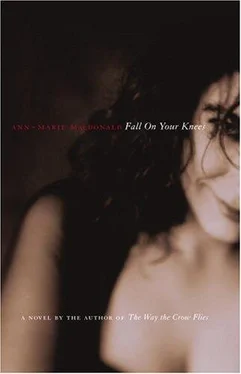She resumed her prayers to the Blessed Virgin. It pierced her heart, and it seemed a dreadful vapour rose from the wound, when she realized she hadn’t given a thought to her daughter all this time. Not a note had she sent, no package of goodies from home, she hadn’t even asked James, “How’s the girl?” Materia saw herself in a clear glass at last, and it was monstrous.
Whom could she tell? No one. Yet she must tell or die.
In the second week, Materia left the house and walked to the cliff but didn’t linger there as she used to. She scrambled down to the rocky shore and walked. She didn’t sing, she talked and talked in her mother tongue to the stones, till she grew dizzy and the day grew grey and she lost track of where she was. Finally, as sometimes happens in this part of the world, the clouds lifted. A burning sky lit the sea in rippling tongues of red and gold. Materia fell silent. She faced the horizon and listened until she heard what the sea was saying to her: “Give it to me, my daughter. And I will take it and wash it and carry it to a far country until it is no longer your sin; but just a curiosity adrift, beached and made innocent.”
And so, day after day, Materia slowly let her mind ebb away. Until she was ready to part with it once and for all.
“I’m very fond of dividing and classifying and examining, you see I’m so much alone, I’ve so much time for reflection, and Papa is training me to think.”
CLAUDIA, BY A.L.O.E.
The strike ended in April 1910, and James got a job on the surface as a checkweighman in reward for his loyalty. He had expected to see his pit buddy Albert up there too, had hoped to get a look at him in the light of day, but Albert had been let go. He had moved on to Sydney with many others from Fourteen Yard, and settled in Whitney Pier in the neighbourhood known as The Coke Ovens. There were lots of people there up from the West Indies; the Dominion Iron and Steel Company knew the value of a strong man who could stand heat. The Coke Ovens was a cosy community, its houses painted everything but white, snuggled right up against the steel mill. The mill put bread on the table and a fine orange dust on the bread.
In the boom town the company houses were tenanted once more, the Company Store took miners’ scrip again, the last children were buried and Kathleen came home. James had a surprise waiting: electric lights, and a modern water-closet complete with indoor toilet, enamel tub and nickel-plated taps, hot and cold.
What with his hours at the pithead, James could no longer drive Kathleen to and from Holy Angels. He hired a fellow from The Coke Ovens who drove his own horse and buggy. James was taken aback by his youth — Leo Taylor was barely sixteen — but he was steady, James made sure.
“No detours, straight there and straight home.”
“Yes sir.”
“I don’t want you talking to her.”
“No sir.”
“Don’t touch her.”
“I wouldn’t.”
“I’ll kill you.”
“Don’t worry, sir.”
James reflected that he’d rather have a timid youth drive his daughter than a leering man. The fact that Taylor was coloured made James feel all the more confident of the necessary distance between driver and passenger.
Although she no longer had any buddies in the boom town, Kathleen was relieved to be living at home again. Boarding at Holy Angels had been lonely. At first she’d cried herself to sleep, comforted only by the notes and treats that her daddy sent. But she knew that sacrifices were being made, knew what was expected of her, didn’t flinch. She studied hard, obeyed the nuns and never complained, though she did pray for a fairy godmother to send her a friend, for there was no one to play with at Holy Angels. No boys. No cinders embedded in her knees. Other little girls weren’t interested in swordfights and adventure or in who could enact the most spectacular death scene. Other girls were preoccupied with meticulous feminine arcana of which Kathleen knew nothing; what was more, none of them had careers. Initially, her schoolmates had vied for Kathleen’s friendship — she was so pretty, so smart. But she failed to decode pecking orders, declined gracious invitations to braid other girls’ hair and made a lasso of the skipping-rope. They put her down as odd until, finally, they shunned her altogether.
Kathleen threw herself into her work and cultivated an insouciant nonconformity — her sash low-slung and tied in front, hat pushed back, hands jammed into the pockets that she ordered her mother to sew into her uniforms, her long hair waving loose. The nuns made allowances. She had a gift.
In the fall of 1911 they sailed to the mainland — James, Kathleen and her singing teacher, Sister Saint Cecilia — to a recital at the Royal Conservatory of Music in Halifax. An invited audience of professionals.
“Look me in the eyes.”
She did. He invoked the spirits,
“What did Stendhal say of Elisabetta Gafforini?”
“‘Whether you see, or only hear her, your peril is the same.’”
“That’s the stuff.” His usual affectionate bonk on the head. “Now go out there and show ’em who’s boss.”
Kathleen sang Cherubino’s love poem to Susanna from Le Nozze di Figaro . Teachers from New York City gave James their cards, they were looking for the next Emma Albani. Told him what he already knew.
Henriette Sontag debuted at six, Maria Malibran at five; Adelina Patti was younger every year, her legend already way ahead of her mortality; but James was so serious about Kathleen’s career that he could wait for it to begin. Patience is the mark of the true player. Her voice would last, not burn out in a blaze of adolescent glory. He would send her to Halifax for a year to get her sea-legs. Then on to Milano at eighteen.
Kathleen turned twelve.
“When Malibran’s father told her she must go on for Giuditta Pasta, as Desdemona to his Otello, he looked her in the eye and swore that if she did not sing perfectly, when it came to the scene where Otello murders Desdemona, he really would kill her.”
Kathleen laughed and said, “You’re a melodramatic old feller, aren’t you.”
Materia marvelled. The girl was saucy, she deserved a good slap talking to her father like that, but never got one, got a chuckle and a wink instead.
Kathleen had a way of swaggering a little even standing still, and especially when leaning against a piano. She didn’t yet know how beautiful she was, but she’d begun to suspect. She’d begun to care about how she walked, to gauge her effect on others. She practised world-weary expressions in front of the mirror. She looked up the word “languid”. She adopted a tone of amused scorn and loved to kid her father about his romantic obsession with la Voce , ordering him to fetch her grapes and peel them too. “If I’m going to be a diva, you’d better start treating me like one.”
He loved her way: acting casual, working like a Trojan, singing like an angel. Not “angelically”. The voice of an angel. Winged, lethal, close to the sun.
When Malibran died too young too fast —
“Sure, sure, her voice went into her husband’s violin. And pigs fly.”
She had the world by the tail. A modern girl. James had read about the “New Woman”. That’s what my daughter’s going to be.
One Friday afternoon in March 1912, while Materia is in the kitchen cooking a magnificent silent supper and James is half-entombed in the old piano, Kathleen appears in the archway of the front room.
She’s wearing her Holy Angels uniform. She’s grown tall. Leaning in the doorway, her weight on one hip, feeling her teens though they’re a year off. A smile plays about her mouth at the sight of her old dad toiling over the strings of that decrepit war-horse. She glances down, bites her lip, then steals over to the piano and strikes a chord.
Читать дальше












